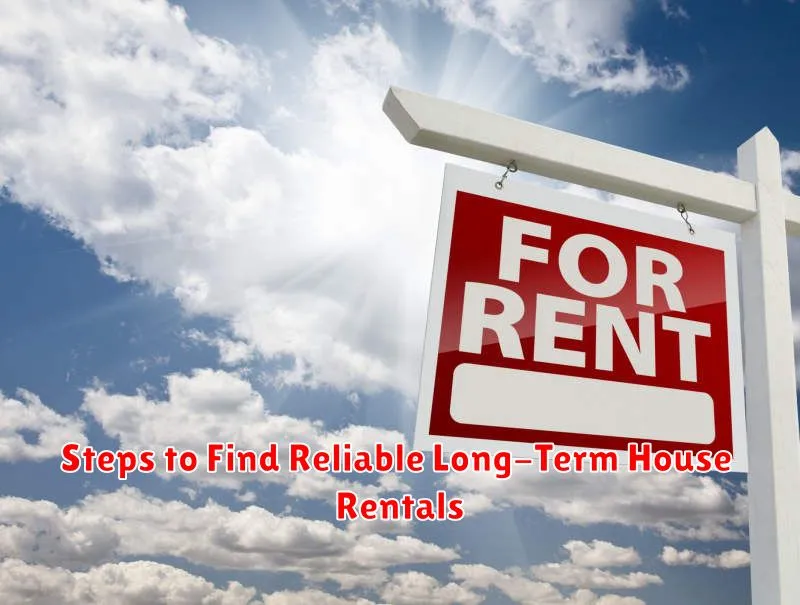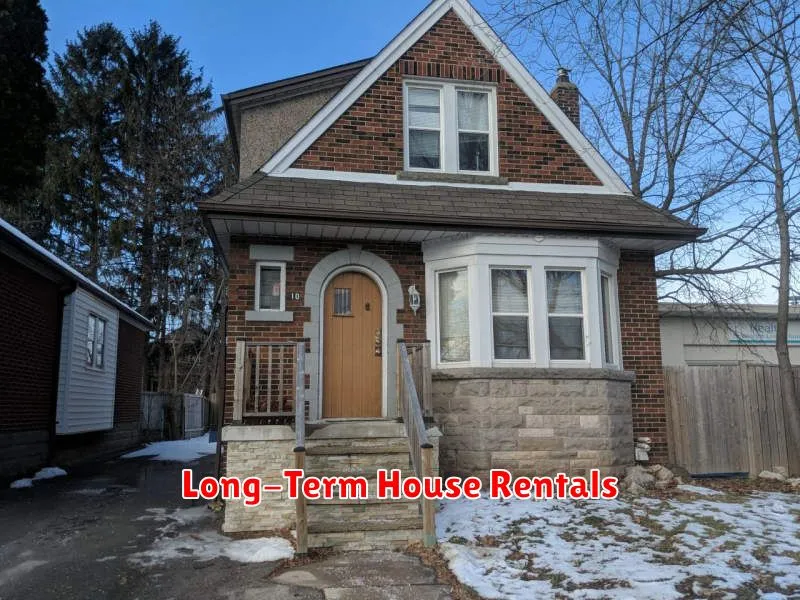Finding the perfect long-term house rental can be a game-changer, offering stability and comfort. But securing the best long-term house rental requires more than just luck; it demands a strategic approach. This guide will equip you with the essential tips and tricks to navigate the rental market effectively, helping you secure a fantastic long-term lease on a property that truly feels like home. We’ll cover everything from defining your needs and searching strategically to negotiating the lease and securing the property. Let’s embark on this journey together to find your ideal long-term house rental!
Why Long-Term Rentals Are Cost-Effective
Long-term rentals offer significant cost advantages compared to short-term options. Lower overall costs are a primary benefit. Landlords often offer discounted monthly rates for longer lease agreements, making it more affordable than paying higher weekly or monthly prices for short-term stays.
Another key factor is predictability and budgeting. With a long-term lease, your housing costs remain consistent and predictable for an extended period, simplifying budgeting and financial planning. This eliminates the uncertainty of fluctuating short-term rental rates.
Furthermore, long-term rentals frequently include utilities and amenities in the monthly rent, or at least offer more stable and predictable utility costs. This contrasts sharply with short-term rentals, where utility costs can vary widely and be added separately, potentially increasing the overall expense.
Finally, the lack of booking fees and cleaning charges associated with short-term rentals represents a considerable cost saving with long-term options. These recurring fees can add up significantly over time, making long-term rentals a more financially sound choice.
Steps to Find Reliable Long-Term House Rentals

Finding a reliable long-term house rental requires a strategic approach. Start by defining your needs and budget. Consider factors like location, desired amenities, and commute distance.
Next, leverage various resources. Explore reputable online platforms specializing in long-term rentals, connect with local real estate agents, and check classified ads in your target area. Don’t neglect networking; word-of-mouth referrals can be incredibly valuable.
Thoroughly vet potential properties and landlords. Schedule in-person viewings to assess the property’s condition and surrounding neighborhood. Request references from previous tenants and verify the landlord’s legitimacy. Carefully review the lease agreement before signing, ensuring all terms are clear and acceptable.
Finally, secure the rental with a formal agreement. Pay attention to the payment schedule and methods. Ensure you understand the terms regarding utilities, maintenance, and lease renewal. Once you’ve signed, keep a copy of the lease agreement for your records. By following these steps, you’ll greatly improve your chances of securing a reliable long-term house rental.
How to Negotiate Rent for Extended Leases
Negotiating rent for an extended lease can significantly impact your long-term housing costs. The key is preparation and a professional approach. Before approaching your landlord, research comparable rental rates in your area. This gives you a strong foundation for your negotiation.
When discussing the lease extension, emphasize your reliability as a tenant. Highlight your consistent on-time rent payments and responsible tenancy history. Offer a longer lease term than initially expected; this demonstrates your commitment and can incentivize a lower rate.
Propose a specific rent reduction, supported by your market research. Be prepared to justify your proposed amount. A reasonable counter-offer, showcasing your understanding of the market value, is often more successful than aggressive demands.
Consider offering to pay rent in advance or make other concessions, such as handling minor repairs or paying for upgrades. This adds value to the landlord’s perspective and shows your willingness to cooperate.
Document everything in writing, including the agreed-upon rent, lease term, and any other concessions. Make sure both you and the landlord sign the updated lease agreement to avoid future disputes.
Finally, remember that negotiation is a two-way street. Be polite, professional, and understanding. Even if you don’t secure the exact reduction you wanted, a compromise is still a positive outcome.
Key Features to Look for in Long-Term Housing
Securing a great long-term rental involves more than just a pretty facade. Consider these key features to ensure your comfort and satisfaction for years to come:
Location, Location, Location: Proximity to your workplace, schools, grocery stores, and other essential services is paramount. Think about commute times and the overall convenience of the neighborhood.
Safety and Security: Look for properties in safe neighborhoods with low crime rates. Features like security systems, well-lit areas, and secure building access are significant pluses.
Size and Layout: Ensure the property’s size and layout meet your current and future needs. Consider the number of bedrooms, bathrooms, and living spaces required for your lifestyle.
Amenities: Consider features that enhance your lifestyle. This could include in-unit laundry, a garage or parking space, a private yard or balcony, or access to community amenities like a pool or gym.
Maintenance and Repairs: Inquire about the landlord’s maintenance policy. Understand who is responsible for repairs and how quickly they’re typically addressed. A responsive landlord is crucial for a positive long-term rental experience.
Lease Terms: Carefully review the lease agreement. Pay attention to the lease length, renewal options, and any clauses regarding pets, subletting, or other important details.
By focusing on these essential elements, you can significantly increase your chances of finding the perfect long-term rental property that suits your needs and budget.
Tips for Managing Utilities and Maintenance
Understanding utility bills is crucial for long-term rental success. Before renting, clearly outline who is responsible for paying for each utility (water, electricity, gas, internet) in your lease agreement. Consider providing tenants with a detailed breakdown of average monthly costs to help with budgeting.
Establish a proactive maintenance plan. Regular inspections can prevent small issues from becoming costly repairs. Develop a checklist for routine checks (e.g., smoke detectors, appliances) and schedule preventative maintenance (e.g., HVAC servicing) annually or as needed. This minimizes disruptions for tenants and extends the lifespan of your property.
Create a streamlined repair process. Establish a clear system for tenants to report maintenance issues. This could include a dedicated email address, online portal, or even a simple contact form. Respond promptly to all requests and ensure repairs are handled efficiently by qualified professionals. Quick response times demonstrate responsibility and prevent minor problems from escalating.
Utilize tenant screening effectively. A thorough screening process helps identify reliable tenants less likely to cause property damage or neglect maintenance. Check credit reports, employment history, and rental references to make informed decisions. This proactive step can significantly reduce future headaches related to utilities and repairs.
Consider a maintenance reserve fund. Setting aside a portion of rental income for unexpected repairs and maintenance expenses is a wise strategy. This fund acts as a safety net, ensuring you can address issues promptly without depleting your overall income. Planning for the unexpected is crucial for long-term financial stability.
Conclusion: Benefits of Long-Term House Rentals
Securing a long-term house rental offers numerous advantages. Cost savings are significant, as you avoid the fees and hassle associated with frequent moves. You gain stability and peace of mind, knowing you have a consistent place to call home for an extended period. This stability also allows for stronger community ties and a greater sense of belonging in your neighborhood.
Beyond the financial and emotional benefits, long-term rentals often provide more negotiating power. Landlords may be more willing to accommodate your needs and requests, such as pet allowances or minor renovations, when you’re committing to a longer lease. Ultimately, choosing a long-term rental can significantly improve your quality of life by offering financial security, emotional stability, and a more personalized living experience.

